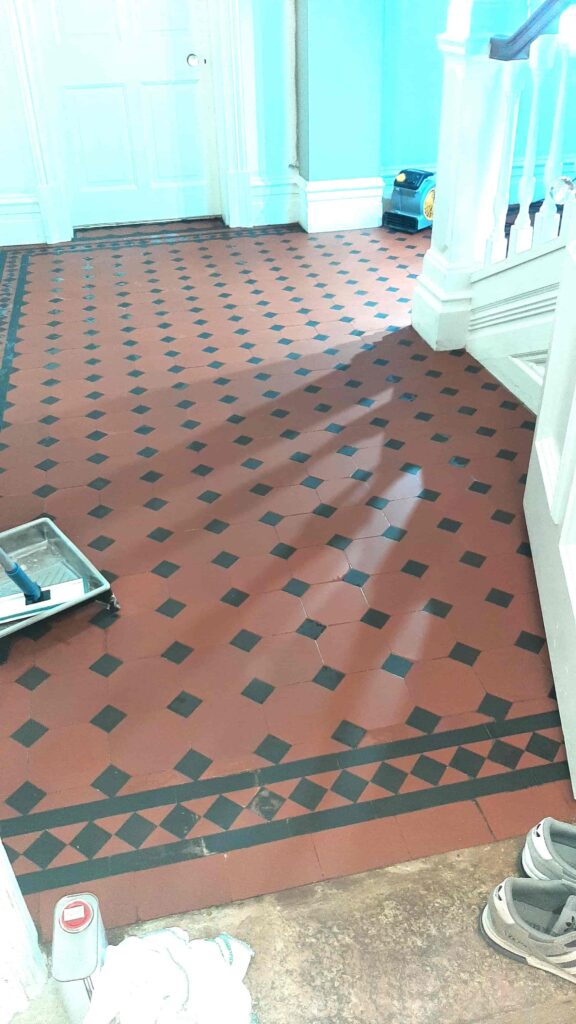The photos below are of a Victorian tiled floor at a property in York, which was found under the hallway carpet and underlay. The carpet had been secured with glue which had left a lot of stains on the tile as well as the usual marks and plaster left on the surface from building works. The carpet had done a good job of protecting the tiles, but I could see there was a lot of ingrained dirt in the tile itself which would need removing.

The owners were keen to have the floor restored however It was a busy household and with the hallway being in constant use the work would have to be done in sections to allow for access and completed quickly to minimise impact. I worked out a quote which was accepted, and a date set for the work to be done.
Cleaning Victorian Tiles Tiles
To soften the plaster staining and breakdown the ingrained dirt I sprayed the floor with a strong dilution of Tile Doctor Pro-Clean mixed with Remove and Go and left it to soak into the section of tiles. This is a strong combination of products which combine to produce an effect tile and grout cleaner and coatings remover which will not only clean the tile but also strip off what was left of the original sealer as well as any contaminates.
After ten minutes the solution was scrubbed into the tiles using a coarse 100-grit diamond burnishing pad. The pad scrubs away at the tile and opens the pores in the tile allowing the dirt to be flushed out. The cleaning solution soon turns black with the dirt which is then removed using a powerful industrial wet vacuum. This process was then repeated using a 200-grit pad which further cleans the Victorian tiles and improves their appearance and removed years of dirt and stains.
 |
 |
The floor was then treated to an acid rinse using a dilution of Tile Doctor Grout Clean-Up worked in with a Black scrubbing pad. This treatment further cleans the tiles and will counter any efflorescent salts which can build up in an old floor like this that doesn’t have a damp-proof membrane installed. These old floors need to breathe so moisture can rise through the tile and evaporate at the surface however carpet and underlay prevents this so efflorescence is always a concern. The acidic nature of the product also neutralises the pH level of the floor following the use of the strong alkaline cleaning products earlier.
After a further rinse the floor was dried with the wet vacuum and then left to dry off fully overnight ready for sealing the next day.
Sealing Victorian Tiles Tiles
Upon my return to the property, I took several moisture readings from the tiles which confirmed they had dried and were ready to be sealed. Sealing protects the tiles from ingrained dirt ensuring that dirt remains on the surface where it can be easily removed.
The sealer chosen for this floor was Tile Doctor Colour Grow which was chosen because its fully breathable thereby allowing moisture to pass through the tile, it also contains a colour enhancer that brings out the red colours in the clay tile.
 |
 |
The hallway tiles now looked clean and much brighter, needless to say my customer was very happy with the transformation and by working in sections I was able minimise disruptions.

Source: Victorian Floor Tile Cleaning and Renovation Service in York
Serving North Yorkshire including York, Chris Allen is your local Stone, Tile and Grout maintenance expert. Additionally he is an agent of Tile Doctor, the largest professional Tile, Stone and Grout restorative cleaning network in the UK. Tile Doctor has developed products and techniques to handle a multitude of issues surrounding tile, stone and grout, interior, exterior, domestic or commercial.